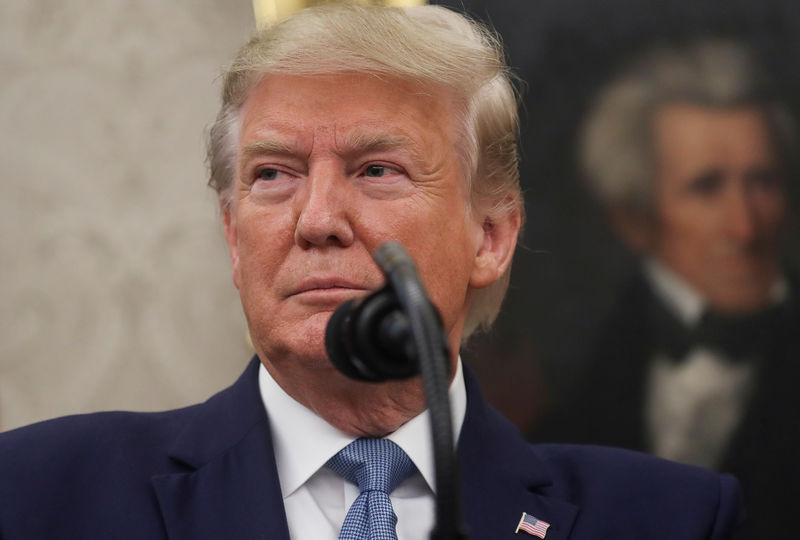By Jan Wolfe
WASHINGTON (Reuters) - Republican lawmakers on Wednesday stormed a hearing room at the U.S. House of Representatives where a Pentagon official was to testify in the impeachment probe of President Donald Trump, yelling that it was unfair and violated Trump's rights.
The lawmakers were echoing objections made by White House Counsel Pat Cipollone in an Oct. 8 letter to top House Democrats that said Trump's lawyers must be allowed to call and cross-examine witnesses, access evidence, and be afforded other "basic rights guaranteed to all Americans."
The following examines the procedures followed in past impeachment investigations and explains why, contrary to Republican claims, the current inquiry does not violate Trump's constitutional rights.
WHAT PROTECTIONS HAVE DEMOCRATS ALLOWED TRUMP SO FAR?
Members of three Democratic-led House committees have been interviewing government officials behind closed doors to try to build a case that Trump abused his power by pressuring Ukraine to investigate a rival - Democrat Joe Biden - for his personal political benefit.
While Democrats have led these interviews, Republicans who sit on the committees are also able to review documents and ask questions of the witnesses. Trump's lawyers have been excluded.
Democrats have said they will hold public hearings soon in order to make their case against Trump to voters. House leaders have likened their investigation to a grand jury proceeding, a preliminary stage of a criminal case conducted in secret.
WHAT DOES TRUMP WANT?
Cipollone said the House has "not established any procedures affording the President even the most basic protections demanded by due process under the Constitution and by fundamental fairness" in violation of "every past precedent."
In addition to granting Trump the right to access evidence, examine witnesses, and have counsel present at hearings, the committees must also disclose evidence that is favorable to him, he wrote.
Cipollone argued that Republican lawmakers should be allowed to issue subpoenas, which would enable them to present their own evidence and try to undermine the Democrats' version of events.
The White House also said the investigation was not legitimate because the full House had not voted to authorize it.
WHAT HAS HAPPENED IN PAST IMPEACHMENT INQUIRIES?
In U.S. impeachment proceedings, the House investigates and votes to impeach, and the Senate holds a trial to determine guilt or innocence and whether the president stays in office.
Some of the protections requested by the White House were given to Bill Clinton and Richard Nixon, the two presidents in modern history to face impeachment probes.
The House allowed Nixon's defense lawyers to respond to evidence and testimony during his impeachment inquiry. Nixon resigned from office in 1974 before being impeached, however.
Twenty-five years later, Clinton was afforded similar protections. Clinton was impeached by the House but not convicted by the Senate.
In both of those cases, the House also held a full vote to authorize an impeachment inquiry.
Some scholars have said that Clinton's case was unique and cannot be likened to the current proceeding, however, because the Republicans who impeached Clinton relied on evidence laid out in a report by former independent counsel Kenneth Starr, who Democrats accused of political bias.
IS THE TRUMP IMPEACHMENT INVESTIGATION UNCONSTITUTIONAL?
According to several experts, no.
Frank Bowman, a law professor at the University of Missouri, said the U.S. Constitution gives the House the freedom to set its own ground rules for the process.
No full vote is needed to authorize an investigation and the House is not obligated to let Trump's lawyers participate, Bowman said.
"Trump has no standing whatsoever to insist that the House do impeachment the way he would like it done," Bowman said.
Bowman added that fairness to Trump is more of a concern if there is a trial in the Senate, which is currently controlled by Republicans. Like the House, the Senate has broad authority to set its own impeachment rules.
But some legal experts said giving Trump basic protections and allowing his lawyers to participate would make the impeachment investigation appear more fair.
That could be a wise political move for Democrats, said Ross Garber, who teaches impeachment law at Tulane Law School and has represented four governors in impeachment proceedings.
Bypassing due process safeguards that are standard in the U.S. legal system "may make the American people question the legitimacy of the impeachment process," Garber said.

(This story removes extraneous word in sub-headline)